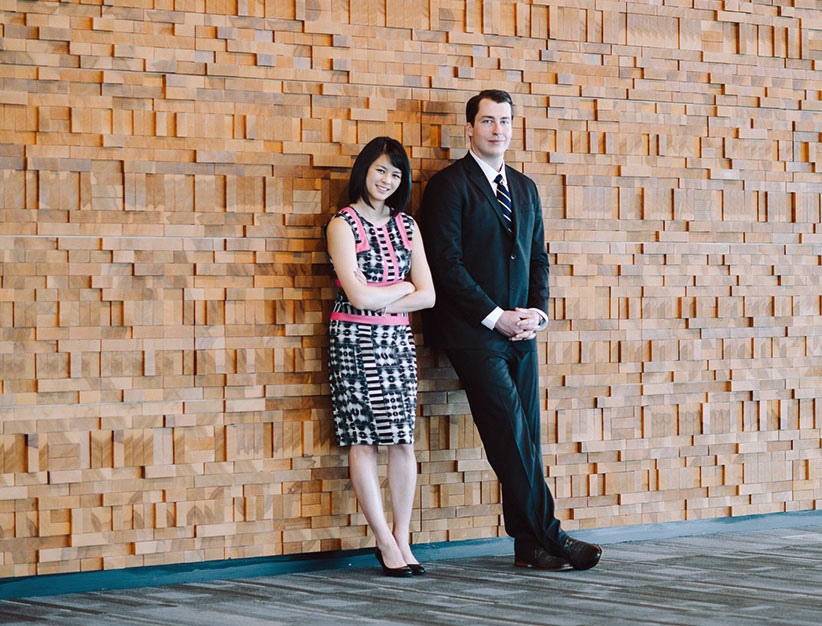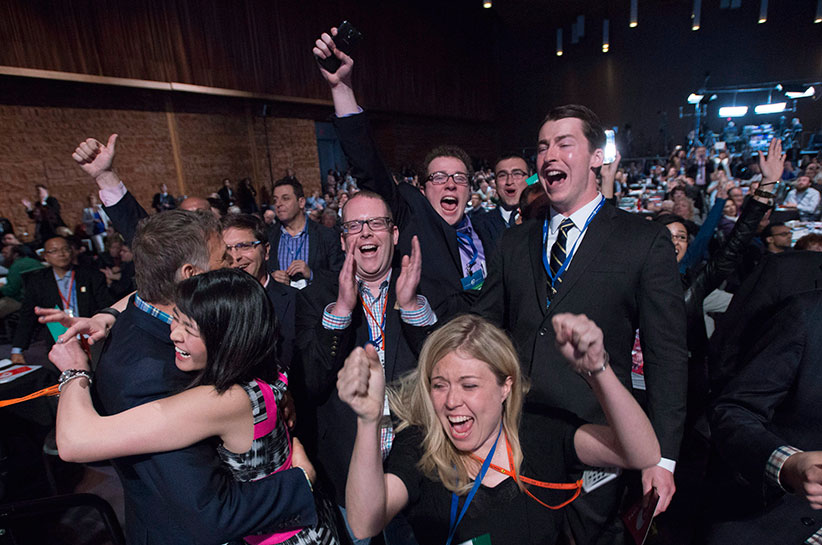How grassroots Tories changed their party’s definition of marriage
Joseph Heap and Natalie Pon teamed up with a Calgary MP to out-hustle those in the party opposed to updating CPC policy on marriage

Share
One night last fall, Joseph Heap, a 26-year-old northern Alberta electrical engineer, was scanning political news on Reddit when he came across a curious post about a Conservative policy plank. The Fort McMurray resident, who’d first joined the party in 2013, had never heard of the party’s definition of marriage as a “union between one man and one woman.” No — it doesn’t say that, he thought to himself. Does it? But there it was, he soon realized, clearly spelled out in the party’s policy declaration. He was appalled.
So, shortly after the Liberals’ majority win last fall, Heap, riding association president for Fort McMurray–Cold Lake, partnered with Natalie Pon, a 24-year-old accountant from Edmonton, to permanently excise a sentence they don’t believe belongs in Conservative policy. The motion they co-sponsored to do it has become one of the hottest debates at this weekend’s Conservative policy convention, and a key test of the party’s new direction as it attempts to chart a new route to victory. This afternoon, the fight will head to the convention floor, when the 2,300 party delegates gathered in Vancouver for the Tories’ biennial policy conference are scheduled to vote on the motion. (Update: The Conservative party voted to delete the same sex marriage ban.)
“I just don’t believe this is something the government needs to insert itself into a relationship between two consenting adults,” says Heap, who leans libertarian. “Fundamentally it’s a liberty issue for me.”
Pon, who sits on the executive of the Edmonton West riding association, was equally horrified when she first stumbled on the marriage definition after reading the party’s policy declaration front-to-back ahead of last fall’s election.
They teamed up in January, at a Calgary meeting of the Alberta Congress, the party’s policy forum for Albertan members of the Conservative Party of Canada (CPC). Each, unbeknownst to the other, had brought forward identical resolutions to kill the plank at Congress that weekend. It was in fact their first meeting. The twin motions passed almost unanimously.
They have been working on the motion every day since — cold-calling Conservative MPs and leadership candidates, hunting out supporters for the motion on Twitter and social media, and planning strategy, a fight that pitted them against a well-known special interest group, the Campaign Life Coalition, who worked to oppose them.

One of their early, high-profile recruits to the fight was Calgary–Nose Hill MP Michelle Rempel. “When you look at Canadian pluralism, what unites us are our shared values,” said Rempel, who championed their motion in a policy workshop yesterday to determine whether the vote should move to the convention floor. “But we have to ensure equality among Canadians — every definition of that word.”
But to sell it yesterday, Rempel, 36, chose a more personal tack, telling party faithful about her cousin: “She is brilliant. She contributes to our country. And she’s gay,” Rempel said, her voice cracking. “Our party is the party of equal rights. We are the party of equality and freedom, and it’s about time we passed this resolution.”
In the end, they did, thanks to Heap and Pon, who were able to out-hustle the other side. At first “it was their people crowding the room,” says Pon, whose Grade 9 yearbook lists her ambition to be “the best female Prime Minister Canada has ever had.” Indeed, the first few motions — including one on doctor-assisted dying — went overwhelmingly their way. That’s when Pon and Heap kicked up efforts to flood the room with friendlies. Soon, delegates packed the room like sardines, lining the walls and crowding the back, some reaching their arms through the doors from the outside, waving green and blue voting cards, struggling to make them visible to counters.
In the end, they voted 279-143 to strike the traditional definition of marriage from party policy, pushing the issue to the full convention floor. Rempel, who considers herself a proud, Conservative feminist, was in tears when the final count was announced.
“I got emotional, right?” she told Maclean’s with a frustrated sigh. “It’s a thing chicks do,” she added, sarcastically. “But if you’re flying across the country every week and you have 110,00 people who have given you this amazing privilege to go and be their voice, you should be passionate about it.”
Many of her opponents, however, were furious. Chief among them was Saskatoon MP Brad Trost. If adopted, Trost warned, the policy change would “fly like a lead brick” in some parts of Canada. “The traditional family is the bedrock of society. You cannot have a functioning free-enterprise society without it,” he added.

To Trost, the question is an existential one: The party, he warned, will become “Liberal-lite” if the measure passes today. “What’s the point of having another Liberal party?”
To Rempel, who grew up in a middle-class family with francophone roots in the south Winnipeg neighbourhood of St. Vital, supporting this issue doesn’t make anyone less of a Conservative. “I think it makes our party more Canadian.”
She’s been a Conservative since her days at Winnipeg’s arts-focused Glenlawn Collegiate, where she played in three school bands. “My parents were apolitical—they didn’t impose political views on us.” She went on to earn a bachelor’s degree in economics from the University of Manitoba before moving to Calgary in 2004 with her then-husband, where she became more deeply engaged in politics. Soon, she was spending all her holiday time “going off and running political campaigns across the country.” In 2011, she ran herself, in north Calgary.
But the fight over values happening this weekend is hardly limited to gay marriage. Indeed, a very different Conservative party appears to be emerging from Vancouver, and the ashes of the disastrous 2015 election as the party seeks to reinvent itself post-Harper. Already, this iteration is looking a bit more open, a bit more pluralistic, a bit more democratic, a bit more positive—all things that would make it a lot more electable.
“We’re the party of the first African-Canadian MP and cabinet minister,” interim leader Rona Ambrose said in her Friday night keynote, reminding party faithful that Justin Trudeau’s Liberals don’t have a lock on diversity. “The first Muslim MP. The first Hindu MP. The first MPs of Chinese, Greek, and Japanese descent, and the first Senators of Filipino, Korean, Pakistani, and Vietnamese descent” — all were Conservatives, Ambrose noted. “This weekend, we will start to write the next chapter of our story,” she added. “Canada’s Conservatives are ready to look forward.”
Two of the three declared candidates for the party leadership, Michael Chong and Kellie Leitch, have made inclusiveness the primary focus their campaigns. All three support the gay marriage motion. Leitch and Maxime Bernier, the MP from Quebec’s Beauce region, who is also running to head the party, were lined up at mics yesterday to support the marriage equality motion, but were cut for time. Former Harper cabinet minister Monte Solberg told Maclean’s that climate change is the most important policy issue facing the party and country.
At this point, Rempel is still undecided as to whether she’ll throw her hat in the ring. But is she ready? You better believe it.
“Often times women shrink away from promoting themselves. I’ll tell you, I have a great CV – pre-political, and throughout my political career. I think I’m very capable. But one has to ask themselves: How are you going to serve Canadians in that role?”
For now, Rempel wants to focus on “taking the Conservative lens and transposing it over the lens of being a woman. Can those two things be compatible? Are there different viewpoint and ways to look at pushing a feminist agenda?”
“There is something different happening,” says Heap. “We are seeing a younger group of Conservatives with a different definition of what being a Conservative means to them. They are challenging a lot of policies and issues that have been around for a long time.”
Crucially, none of them could be defined as “Red Tories,” in the Brian Mulroney mould. Nor is this some new iteration of the old Reform-Red Tory schism. Heap and Pon are fiscally minded Conservatives who support a limited role for government. Bernier leans libertarian. Solberg is an evangelical former Reformer.
But getting there is not going to be easy, Rempel acknowledges. “A lot of work” first needs to be done “to regain the trust of certain communities in Canada,” she told Maclean’s. Key to that will be dumping retrograde fights over identity issues that came to define the last election, one fought solely on “fear,” says Pon, not without anger — “fear of what is different or of what you don’t understand.”
“As a party I think we have to take ownership of that,” says Rempel. “We have to say look to communities for whom this [rhetoric] was highly offensive we have to say: ‘Look sometimes we get it wrong.’ ”
“I’m not interested in turning a blind eye to injustices,” she is quick to add. “But we have to do that in a way that is not xenophobic, either.”
That debate turned emotional at an election review session Friday where party officials candidly acknowledged the strategic and tactical blunders that upended the 2015 campaign. But it was Urz Heer, a 47-year-old delegate who works for Brampton MP Kyle Seeback, who made the more lasting impressing on the room. She broke down as she assailed the party for its strategy.
“This last election campaign was a disaster. I’m also a Muslim and this campaign targeted us, unfairly,” she said, her voice shaking with emotion.
“This party worked actively and aggressively against my people.” When some delegates fired back that it did not, Heer doubled down: “It did,” she insisted. “It did.”
“This country belongs to everyone, including me. For the first time I felt that I didn’t belong here, and this is my country. It’s unfair. It was unfair to my people.”
To Pon, whose great-grandfather paid the Chinese Head Tax to immigrate to Canada, the issue also felt personal. That could be me, she remembers thinking last summer. In the wake of the ugly campaign, she struggled to reconcile her place in the party.
“Conservative values run through our family — we’re going to work hard, and do what we can to make our lives better. I was raised with those ideals. My grandfather had a Chinese restaurant in a small town in Alberta. He saved every dollar he earned to put his four kids through university.”
For Pon, remaining a Tory meant working to reshape the party, to shift its focus to one based on “inclusivity, integrity and positivity.”
“If we are going to define what a Conservative is based on the definition of marriage then we are doing something wrong,” says Pon. “We are not thinking about what makes us Conservative. We don’t need to repeal laws that have been in existence for 10-plus years. We need to look forward to fiscal or foreign polices that make us Conservative but also let us be inclusive and accepting of all people in our party. We want fiscal Conservatives who believe in gay marriage or are gay. We don’t want to exclude them. I’m sick of hearing us complain about ‘these guys doing this,’ ” she adds. “I want to know what would we do to make it better? What is the Conservative plan to make Canada a better place?”
This is hardly a wholesale change, of course. Conservative delegates also voted down a proposal that would have changed party policy to embrace doctor-assisted suicide. And though they voted in favour of decriminalizing possession of small amounts of marijuana, it did not get enough support to move it to the convention floor this afternoon. But marriage equality is seen as an essential first step to creating a more open, more welcoming brand—even if it meant kicking off a fight.
“For a long time I felt that was the side I needed to beat out of me,” says Rempel, ruing her fierce, scrappy id. “You really cheese people off. There are people who are exceptionally unhappy with me right now. But if you’re seeking to make everybody happy and be liked instead of doing what’s right then you probably need to rethink what you’re doing.”
[rdm-gallery id=’879′]
[widgets_on_pages id=”CONSERVATIVE_WIDGET”]